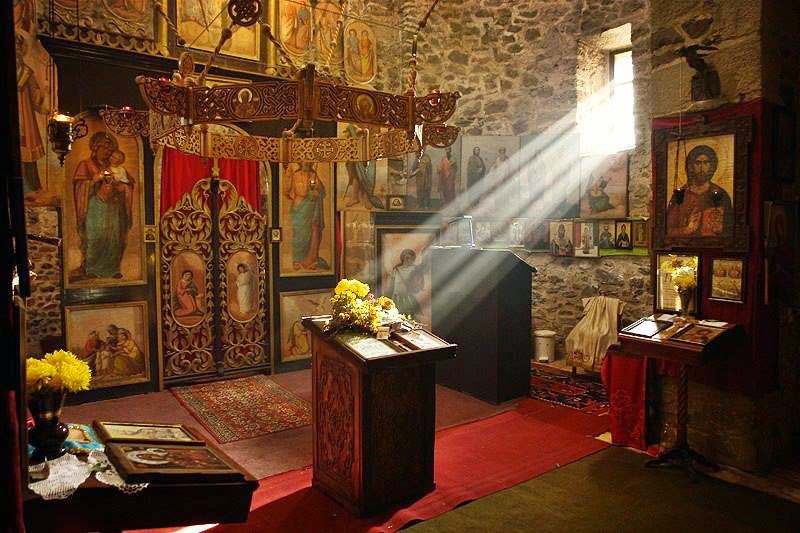
Towards the end of the "Litany of Peace" in the Divine Liturgy the priest includes a short prayer, which is often repeated in the Divine Liturgy as well as in almost all of the Holy Services. This repetition reveals the importance of its content. It says: "Help us, save us, have mercy on us, and protect us, O God, by Your grace".
This request is addressed directly to God by the Deacon or Priest, with the participation of the entire congregation. We could say that it is a summary of the entire Great Litany, which began with the prayer: "In peace, let us pray to the Lord." The key element that is added by this short but comprehensive prayer is the value and power of Divine Grace at work in our petitions to God. From this prayer we see that God freely provides us with His help, whether it is relief from sorrows, healing from diseases, protection from dangers, and the salvation of soul and body. God offers these blessings as a gift, and not due to any good works on our part. If God merely weighed our deeds (the few good and many wicked ones) for judgement in a spirit of absolute justice, we would surely be worthy of condemnation: "If You, Lord, should mark iniquities, O Lord, who could stand?" (Psalm 130:3). So it is not any merit that is earned by our good works (which we often selfishly give undue importance) which saves us, but Divine Grace. The Apostle Paul attributes everything he received from God (going from persecutor of Christ to Apostle of Christ) to this Grace: "But by the grace of God I am what I am" (1 Corinthians 15:10). And to the Ephesians he explains: “even when we were dead in trespasses, made us alive together with Christ (by grace you have been saved)… that in the ages to come He might show the exceeding riches of His grace in His kindness toward us in Christ Jesus. For by grace you have been saved through faith, and that not of yourselves; it is the gift of God, not of works, lest anyone should boast” (Ephesians 2:5-9).
So this Divine Grace, which flows from the sacrifice of Christ on the cross, freed sinful humanity from any guilt and responsibility for Ancestral Sin. The reconciliation of mankind to God was enacted, so we can now address God as the Father and truly feel we are His children, as well as heirs to the Kingdom. Without this Grace, our prayers would have no value, and so we pray:
Lord, help us! Become our Protector and our Refuge!
Save us, since Your Only Begotten Son was sacrificed for our salvation.
Have mercy on us, since you are the God of mercy, compassion and charity, and Your mercy follow us all the days of our lives (see Psalm 23:6).
May our benevolent God, through His Divine Grace, accept all of our prayers that are offered during the Divine Liturgy and at all other times, so that we may richly enjoy His blessings, both here and in Heaven.
The last exhortation of the Deacon to the congregation in the Great Litany (the "Litany of Peace") is: "Commemorating our most holy, pure, blessed, and glorious Lady, the Theotokos and ever-virgin Mary, with all the saints, let us commend ourselves and one another and our whole life to Christ our God." After having prayed for everything, our deacon or priest urges us to commend ourselves to our Lord and God Jesus Christ. In doing this, we have as an example the Virgin Mother and the Saints. Let us remember the faith, love and devotion that they showed to the Lord, so that we, like them, can commend our life and the life of our brothers and sisters to Christ. Dedicating our lives to God is not something that is easily done, and so we ask for the help of the holy, pure, blessed, and glorious Lady, the Theotokos and ever-virgin Mary, and all the Saints of our Church. According to St. Nikolaos Kavasilas, the word commemorating means "to call for help or to pray."
But in order to commend ourselves to the Lord, our love for others must be equal to our love for ourselves. This way, our brothers and sisters become our other self. Then by commending ourselves to God, we also commend them at the same time, guided and moving in a sea of divine love. This is what is emphasized with the two words: "to you, O Lord".
After the priest has addressed God secretly with a prayer in which he outlines and strengthens the prayers of the people, invoking the innumerable blessings of God and His mercy, he says a short doxology to the Triune God: "For to You belong all glory, honor, and worship, to the Father and to the Son and to the Holy Spirit, now and forever and to the ages of ages".
And so, with today’s homily we finished, by the Grace of the Lord, the explanation of the ”Litany of Peace” in the Divine Liturgy.
It should also be mentioned here that the same "Litany of Peace", due to its importance, has been included in the Divine Services of Vespers and Matins, and similarly in other Divine Services.





